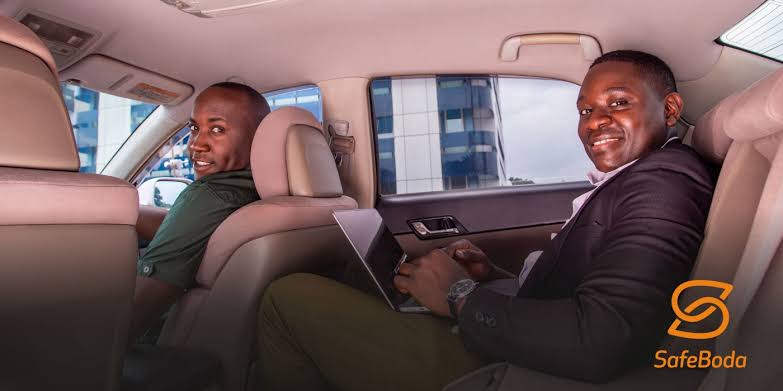Since its introduction seven years ago, SafeBoda, a new bike-hailing firm in Uganda, has maintained market supremacy in the country. Despite opting to begin operations in Ibadan, a sleepy town, rather than the nation’s commercial center, Lagos, in 2020, it has continued in the same stride there. It is currently growing its operational area and adding car-hailing as a new service vertical.
After many weeks of beta testing in Nigeria and Uganda, Safeboda made its car-hailing vertical, Cars by SafeBoda, available to the general public. Before testing for a week in Ibadan, the company did a beta test for two months in Kampala, the capital of Uganda. During that time, they got feedback and made changes to the product.
Read Also: 18-year-old hacks, steals sensitive information from Uber
According to Olaoluwa Arokoyu, Nigeria’s country manager at Safeboda, who spoke in an interview during the testing, “The product is already going through a series of iterations in Uganda, and when it’s done, we’d run a quick one in Nigeria and launch.”
Arokoyu said that even though the industry seems to be full, there is still room for growth in the car-hailing sub-segment because their customers keep asking for it. Over the years, customers have approached us with an unceasing demand for car-hailing. “I’m glad that we have finally answered them,” he said.
What the New feature Implies for Safeboda
With this new vertical, it looks like Safeboda is adding more ways to use mobile money. Every trip on a car by SafeBoda, according to the business, would be cashless, eliminating the hassle of having no change.
“We’re very excited to launch Car by SafeBoda in our super app with a safer, more convenient solution than what is offered in the market,” Rapa said. Ricky Thomson, SafeBoda co-founder and director, said in a statement. “We’ve talked to drivers and passengers, tested our product, and we are going to change transportation in Uganda forever. We are going completely cashless.”
Customers can pay for excursions using the SafeBoda Wallet. Users can load money into their wallets through mobile money, agents, or even by handing the driver cash. In this trick, the driver also functions as an agent. Through the Savings option, customers may also earn interest on any balance they have in their SafeBoda wallet. Because the wallet service isn’t yet completely functional in Nigeria, customers in Uganda would be the only ones to have access to the full capabilities of the wallet for the time being. Users in Nigeria can currently only purchase airtime.
SafeBoda’s goal for the past seven years has been to change transportation in every market where it competes. To keep this goal, the company has had to deal with many market forces. The two largest ride-hailing companies in the world, Uber and Bolt, have tested and challenged SafeBoda’s market share with their boda-boda vertical—first in Uganda and later in Nigeria—but were unable to dent it despite their enormous size seriously.
The business has had its fair share of difficulties. It stopped all of its operations in Kenya in 2020. SafeBoda claimed that COVID-19 was the cause of the suspension, although there were likely more contributing factors, including inadequate traction and the high expense of running a bike-hailing business in Kenya. Hailing a car is generally less expensive than hailing a bike as of the time Safeboda left Kenya, so users who can afford to hail a bike would prefer to go for a car. The average boda-boda ride costs KSh 221 ($2). Additionally, there were offline people who appeared to be more practical (and cheaper).
Riders claimed that Safeboda and other competitors, such as UberBoda and BoltBoda, were eroding company profit margins by lavishly rewarding consumers with discounts. Riders started to reject orders in large numbers as a result, which negatively impacted everyone’s share of the sub-revenue segment’s flow. However, wealthy rivals with car-hailing verticals like Uber and Bolt may easily make up for any losses they would incur on the boda-boda side. All of Safeboda’s vehicles for moving people and delivering products were bicycles.
Due to the government’s significant interest in restricting the highest commission rates that companies can charge on rides, Kenya is currently not an easy area for ride-hailing companies to operate. And the market has already begun to respond in this way. For instance, Little stated that it approves of the new course, whereas Uber has sued the government, claiming that the low rate reduces its ability to cover operating expenses. Furthermore, there is no solid evidence to suggest that Safeboda would take such a step.
Kenya’s Electric Mobility Sector expands with Little’s Products
How is Safeboda Expanding?
Safeboda has maintained operations in just two nations over the past years, cultivating devoted communities and capturing market share. Due to its obsession with market intelligence, it currently controls more than 80% of the Ugandan and Nigerian boda-boda hailing market.
When asked about the company’s expansion plan, without dismissing the possibility of expanding into new cities, Aroyoku said, “There’s still more to do in our current market. There’s a huge opportunity for growth.”
SafeBoda now needs to worry about the car-hailing side in addition to trying to expand its vertical for bike-hailing. Aroyoku is sure that their strategy, which he referred to as a “secret sauce,” would continue to work its magic. However, this time is plainly different because SafeBoda won’t be playing defense but rather entering a market where there are already two powerful market leaders.




